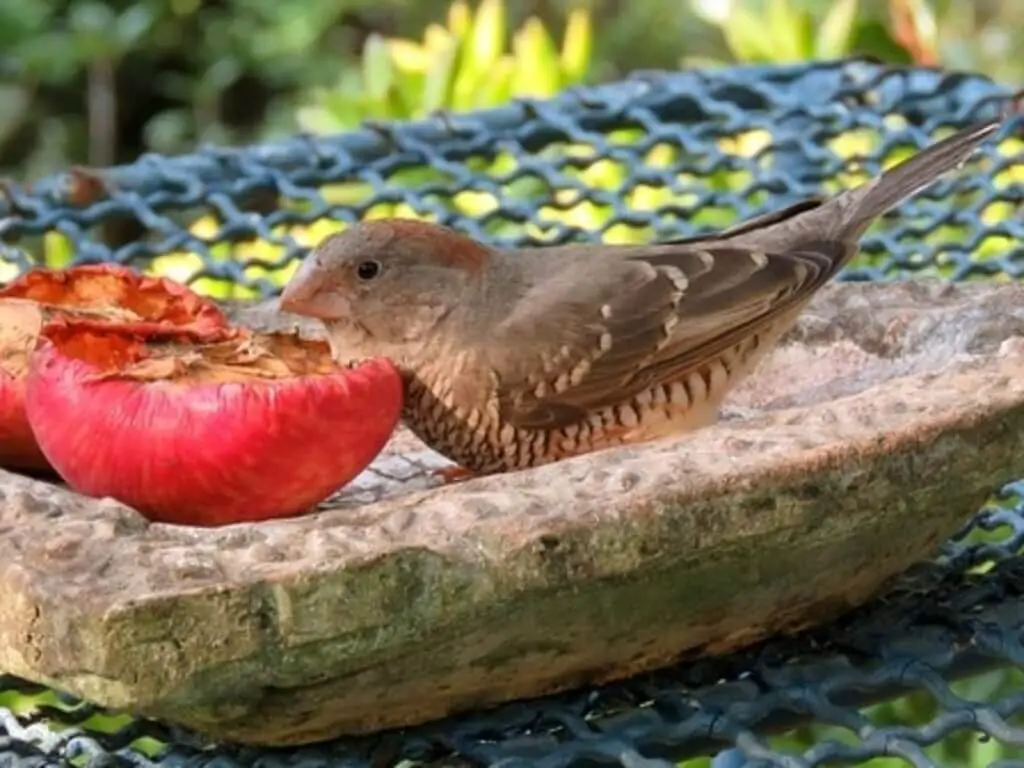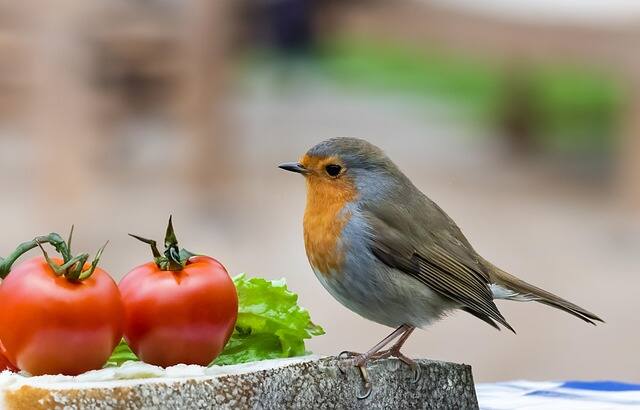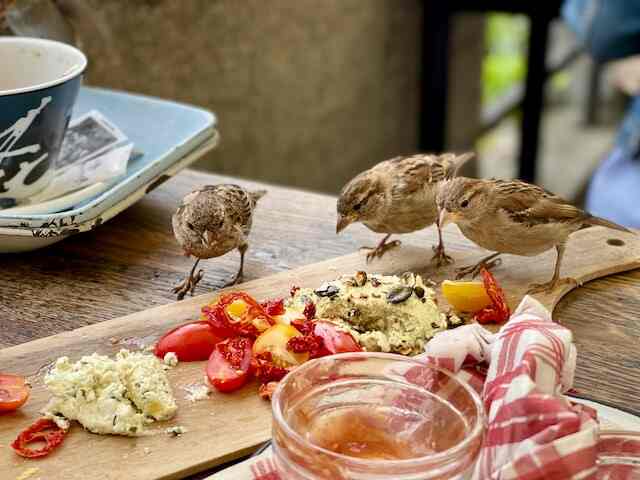“Do Birds Eat Tomatoes?” is a common query among birdwatchers. In this article, we’ll explore avian diets in the United States, addressing the question of whether birds eat tomatoes. We’ll delve into the safety, taste preferences, and potential risks associated with feeding tomatoes to birds.
We’ll also discuss whether other parts of the tomato plant are safe for birds and examine real-world observations of birds interacting with tomatoes in their natural habitats.
Table of Contents
- 1 Key Takeaways:
- 2 Do Birds Eat Tomatoes?
- 3 Understanding Avian Diets: A Diverse Palette
- 4 The Taste of Tomatoes: Do Birds Find Them Appealing?
- 5 Tomato Safety for Birds: Potential Risks and Precautions
- 6 Bird-Friendly Tomato Feed: Enhancing Avian Diets
- 7 Can Birds Eat Tomato Plants? Exploring the Whole Package
- 8 The Impact of Tomato Consumption on Bird Health
- 9 Birds and Tomatoes: Observations in the Wild
- 10 Cultivating Bird-Friendly Tomatoes: Tips for Gardeners
- 11 The Balance of a Bird’s Diet: Tomatoes as a Supplement
- 12 Conclusion
- 13 FAQs
- 13.1 Are tomatoes safe for birds to eat?
- 13.2 Can birds eat tomato plants?
- 13.3 Do birds find the taste of tomatoes appealing?
- 13.4 What potential risks are associated with feeding tomatoes to birds?
- 13.5 How can tomatoes be incorporated into a bird’s diet?
- 13.6 Are there any bird-friendly tomato feed options available?
- 13.7 Is tomato consumption beneficial for bird health?
- 13.8 Have there been observations of birds consuming tomatoes in the wild?
- 13.9 How can gardeners cultivate bird-friendly tomatoes?
- 13.10 Can tomatoes be the main source of nutrition for birds?
- 14 Author
Key Takeaways:
- Birds have diverse diets and can consume a wide range of foods.
- Some bird species may find the flavor of tomatoes appealing, while others may not.
- While tomatoes are generally safe for humans, certain factors may affect their suitability for birds.
- We need to understand whether birds can consume other parts of the tomato plant, such as the leaves, stems, or seeds.
- Observations of birds interacting with tomatoes in the wild can provide valuable insights.
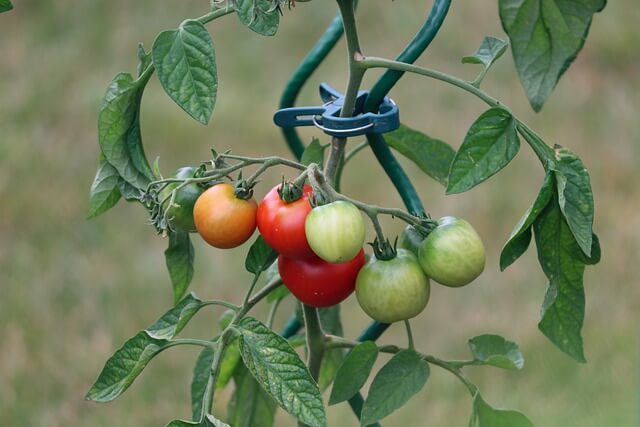
Do Birds Eat Tomatoes?
Yes, many bird species will eat tomatoes, particularly ripe and soft ones. Some birds, such as robins, thrushes, and mockingbirds, may peck at or even consume tomatoes in your garden. Offering small, sliced pieces or placing overripe tomatoes in your yard can attract these fruit-eating birds.
However, not all bird species are interested in tomatoes, and the preferences may vary among individuals and regions. It’s worth experimenting to see if the birds in your area are attracted to this garden treat.
Understanding Avian Diets: A Diverse Palette
As a bird lover, I’ve learned that birds have a diverse diet and can consume a wide range of foods. When it comes to whether birds eat tomatoes, it’s important to understand the variety of foods that make up their diets.
Birds consume foods such as fruits, seeds, insects, nectar, and even small animals. Some species of birds enjoy consuming fruits, including tomatoes, as part of their diet.
It’s fascinating to discover that a bird’s diet may change depending on its habitat, migration patterns, and other factors. For example, some birds that typically consume insects may switch to fruits during certain seasons.
Understanding Avian Diets: A Diverse Palette
To better understand which birds eat tomatoes, it’s essential to explore the dietary preferences of various bird species. For example, thrushes, catbirds, and orioles are known to consume fruits, including tomatoes. However, other bird species may not include tomatoes in their diets.
It’s important to remember that different birds require different diets to maintain their overall health and well-being. While some birds may consume tomatoes, they should not be the sole source of nutrition. Tomatoes can be a supplement to a well-rounded bird diet that includes a variety of foods.
When considering bird-friendly tomatoes, it’s important to choose varieties that are suitable for the location and the birds that visit. Some varieties of tomatoes may contain chemicals or pesticides that can be harmful to birds, so it’s essential to select bird-friendly tomatoes that are free of harmful chemicals.
Overall, understanding avian diets is essential to answering the question of whether birds eat tomatoes. While not all birds may include tomatoes in their diets, they can be a healthy supplement for those that do. When selecting bird-friendly tomatoes, gardeners should keep in mind the nutritional needs and preferences of the birds that frequent their gardens.
The Taste of Tomatoes: Do Birds Find Them Appealing?
When it comes to the question of whether birds eat tomatoes, taste preference is a crucial factor to consider. While some bird species may find the flavor of tomatoes palatable, others may not.
The taste receptors of birds are diverse, and their preferences can vary widely based on species, geography, and other factors. For instance, some birds are known to have a sweet tooth and may be drawn to the sweetness of ripe tomatoes, while others may prefer sour or bitter flavors.
Research suggests that birds are naturally attracted to bright, bold colors in their food, which could make red and yellow tomatoes appealing to some species. Additionally, birds may be attracted to the aroma of tomatoes, which can be strong and distinctive.
Overall, while there is no definitive answer to the question of whether birds find tomatoes appealing, it is likely that certain species may enjoy them as part of their diet.
The Role of Tomatoes in Avian Diets
Tomatoes are not a common component of most bird diets, but they can provide a valuable source of nutrients when included. Tomatoes are an excellent source of vitamins C and K, as well as potassium and folate.
For birds that consume a wide range of foods, such as fruit-eating species, tomatoes can be a beneficial addition to their diet. However, for species that primarily feed on insects or other animals, tomatoes may not provide the necessary nutrition.
What Kind of Birds Like To Eat Tomatoes?
While there is no definitive list of bird species that eat tomatoes, some birds are more likely to consume them than others. Fruit-eating birds such as orioles, tanagers, and thrushes may enjoy eating ripe, juicy tomatoes. Additionally, species with a more diverse diet, such as woodpeckers and some types of warblers, may occasionally eat tomatoes as well.
It is important to note that just because a bird does not typically eat tomatoes does not mean they cannot or will not consume them. Like humans, birds may develop a taste for new foods over time and may be willing to try tomatoes if given the opportunity.
Overall, while not all bird species are likely to include tomatoes in their diets, they can be a healthy and nutritious addition to the meals of some birds.
| Bird Species | Likelihood to Consume Tomatoes |
|---|---|
| Orioles | Likely to enjoy ripe tomatoes |
| Tanagers | May eat ripe, juicy tomatoes |
| Thrushes | Known to consume tomatoes |
| Woodpeckers | Occasionally eat tomatoes |
| Some Warblers | May include tomatoes in their diet |
Tomato Safety for Birds: Potential Risks and Precautions
When it comes to feeding tomatoes to birds, it is important to consider their safety. While tomatoes are generally safe for human consumption, certain factors may affect their suitability for birds. It is essential to take precautions to ensure the well-being of our feathered friends.
Firstly, it is important to note that the green parts of the tomato plant, including the leaves, stems, and unripe fruit, contain solanine, a toxic alkaloid that can be harmful to birds. Therefore, it is crucial to ensure that any tomatoes offered to birds are ripe and free of green or unripe parts.
Moreover, sharing raw tomatoes with birds is not recommended. Raw tomatoes can cause stomach problems for them. It’s important to be aware that tomatoes, particularly in their raw form, may not be suitable for avian consumption, as they can lead to digestive discomfort and other health issues.
Another factor to consider is the presence of pesticides or chemicals on the surface of the tomato. Birds are particularly sensitive to these substances, which can cause anything from digestive problems to death. It is important to thoroughly wash any tomatoes before offering them to birds, preferably using organic methods.
Finally, it is important to remember that tomatoes should not constitute the sole food source for birds. While they can be a healthy supplement to a well-rounded diet, too much of any one food can be detrimental to bird health. It is crucial to offer birds a variety of foods, including fruits, seeds, and insects, to ensure that they receive the necessary nutrients.
In summary, while tomatoes can be a healthy addition to a bird’s diet, it is essential to consider their safety, nutritional value and role as a supplement. By taking the necessary precautions and offering a variety of foods, we can create bird-friendly environments that promote the health and well-being of these fascinating creatures.
Bird-Friendly Tomato Feed: Enhancing Avian Diets
As we have discussed, while tomatoes can be a part of some bird species’ diets, it is crucial to consider their safety and nutritional value. If you decide to incorporate tomatoes into bird feed, it is essential to make sure that they are bird-friendly and do not contain any harmful additives.
When creating bird-friendly tomato feed, start with fresh, ripe tomatoes that are free of pesticides and other harmful chemicals. You can also mix tomatoes with other bird-friendly foods like seeds, fruits, and insects to create a well-rounded diet.
It is important to remember that, just like with any food, moderation is key. Tomatoes should not be the primary source of nutrition for birds but should be considered as a supplement to a balanced diet.
While not all bird species are likely to eat tomatoes, those that do include species like thrushes, robins, and mockingbirds. If you are interested in attracting these birds to your garden, consider growing bird-friendly tomatoes that are small, easy to eat, and high in vitamins and minerals.
Overall, incorporating tomatoes into a bird’s diet can be an excellent way to enhance their nutrition and promote their well-being. By making informed choices and creating bird-friendly environments, we can better support the fascinating birds that share our world.
Can Birds Eat Tomato Plants? Exploring the Whole Package
In addition to the delicious fruit, people often wonder if birds can safely consume other parts of the tomato plant, such as the leaves, stems, or seeds. After thorough research, it has been determined that while some parts of the tomato plant are safe for birds to eat, other parts can be harmful and should be avoided.
The fruit of the tomato plant is safe for birds to eat, and some species may find the taste appealing. However, the leaves, stems, and unripe fruit contain solanine and tomatine, two toxic substances that can be harmful to birds if ingested in large quantities.
If you are considering incorporating tomato plants into your bird-friendly garden, it is essential to take precautions to ensure the safety of your feathered friends. Make sure to pick ripe tomatoes and avoid allowing any unripe fruit to fall to the ground, where birds may consume it. Avoid using any pesticides or fertilizers that could be harmful to birds, and keep tomato plants out of reach of any pets or livestock that may be tempted to nibble on them.
The Impact of Tomato Consumption on Bird Health
Tomatoes can be a valuable addition to a bird’s diet, providing important nutrients and health benefits. For example, tomatoes are a good source of Vitamin C, which is essential for healthy skin and feathers. They also contain Vitamin A, which supports healthy vision and immune function.
In addition, tomatoes are rich in antioxidants, which can help protect against cell damage. This may be particularly important for birds that are exposed to pollutants or environmental stressors.
While not all bird species may enjoy eating tomatoes, those that do may benefit from incorporating them into their diets as a supplement. Some birds that are known to enjoy tomatoes include robins, bluebirds, and thrushes.
However, it is important to remember that tomatoes should not make up the bulk of a bird’s diet. Instead, they should be offered in moderation alongside other healthy food sources, such as fruits, seeds, and insects.
Birds and Tomatoes: Observations in the Wild
Observing birds in their natural habitats can provide valuable insights into their dietary preferences and behaviors. While not all bird species consume tomatoes, there are some observed instances of tomato consumption by certain types of birds.
Birds that are known to consume tomatoes include American Robins, Cedar Waxwings, and Northern Mockingbirds. These birds are often seen perching on tomato plants and pecking at the fruit. They may also be attracted to other ripe fruits and berries in the garden.
It is important to note that while some birds may consume tomatoes, their diet preferences can vary widely depending on their geographic location, season, and availability of food sources. Therefore, it is not safe to assume that all birds will eat tomatoes, and careful observation is necessary to determine their preferences.
Additionally, it is important to consider the potential impact of human activities on bird behavior. For example, providing bird feeders or other sources of food may alter their natural feeding patterns and preferences. Careful observation and research can help inform decisions about creating bird-friendly environments that promote their health and well-being.
In conclusion, while some bird species may include tomatoes in their diets, it is important to consider their safety, nutritional value, and role in a balanced diet. By understanding avian diets and making informed choices, we can create bird-friendly environments that promote the health and well-being of these fascinating creatures.
Cultivating Bird-Friendly Tomatoes: Tips for Gardeners
If you’re interested in attracting birds to your garden, growing bird-friendly tomatoes can be a great way to do so. But what makes a tomato bird-friendly? Here are a few tips:
- Choose heirloom or open-pollinated varieties. These types of tomatoes are often more flavorful and have a wider range of colors and shapes, which can be more appealing to birds.
- Plant a variety of tomato plants. By growing different types of tomatoes, you can attract different bird species that may prefer different flavors or textures.
- Plant your tomatoes near other bird-friendly plants. Birds are more likely to visit your tomatoes if they have other sources of food, water, and shelter nearby.
- Avoid using pesticides or herbicides. These chemicals can be harmful to birds, so it’s best to use natural methods to control pests and weeds.
By growing bird-friendly tomatoes and creating a welcoming environment for birds in your garden, you can not only enjoy a bountiful harvest but also help support the health and well-being of our feathered friends.
The Balance of a Bird’s Diet: Tomatoes as a Supplement
While tomatoes can be a healthy addition to a bird’s diet, it is important to remember that they should not be the only food source. A balanced diet is essential to ensure that birds receive all the necessary nutrients for their health and well-being.
When considering incorporating tomatoes into a bird’s diet, it is important to know which birds enjoy them. While not all birds are interested in eating tomatoes, some species such as robins, finches, and mockingbirds have been observed consuming them in the wild.
However, it is important to note that tomatoes should not make up the majority of a bird’s diet. They should be considered as a supplement to other nutritious foods, such as seeds, fruits, and insects. A varied diet is crucial to meet a bird’s specific nutritional needs, and it is important to consult with a veterinarian or bird expert to ensure that their diet is balanced.
When introducing tomatoes to a bird’s diet, it is important to start slowly and in small quantities. This allows birds to adjust to the new food without upsetting their digestive system. It is also important to offer fresh, ripe, and organic tomatoes whenever possible to avoid any potential pesticides or chemicals that may be harmful to birds.
Overall, tomatoes can be a healthy and enjoyable addition to a bird’s diet when offered in moderation and as part of a well-rounded nutritional plan. By understanding a bird’s dietary needs and preferences, we can take steps to ensure their health and well-being, while also enjoying the beauty and diversity of avian life.
Conclusion
After exploring the complex world of avian diets and tomato consumption, it is clear that the answer to whether birds eat tomatoes is not a straightforward one. While some bird species may enjoy the taste of tomatoes and find them nutritious, caution must be exercised when feeding them to birds.
It is important to remember that a bird’s diet should consist of a variety of foods to ensure they receive all the necessary nutrients for optimal health. While tomatoes can be incorporated into a bird’s diet as a supplement, they should not serve as the primary source of nutrition.
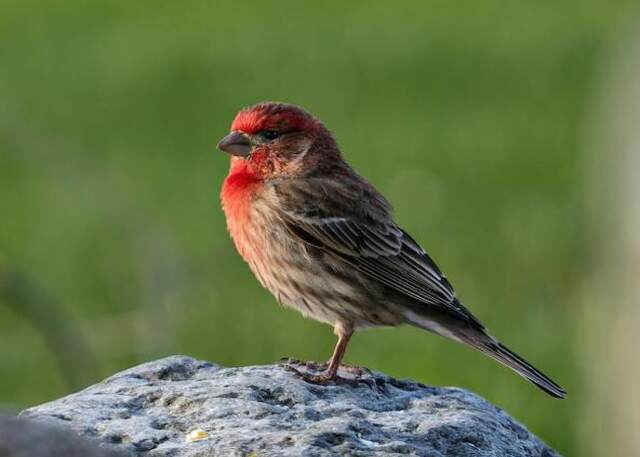
FAQs
Are tomatoes safe for birds to eat?
Generally, tomatoes are safe for birds to eat, but certain precautions should be taken.
Can birds eat tomato plants?
Birds may consume parts of tomato plants, such as leaves, stems, or seeds, but their safety and nutritional value should be considered.
Do birds find the taste of tomatoes appealing?
Taste preferences vary among bird species, so some may find the flavor of tomatoes appealing, while others may not.
What potential risks are associated with feeding tomatoes to birds?
While tomatoes are generally safe, certain factors may affect their suitability for birds. Precautions should be taken to ensure their well-being.
How can tomatoes be incorporated into a bird’s diet?
Tomatoes can be included as a part of a healthy bird diet, but they should not serve as the sole food source. They can be used as a supplement.
Are there any bird-friendly tomato feed options available?
Yes, bird-friendly tomato feed can be created to enhance avian diets, but modifications and considerations may be necessary.
Is tomato consumption beneficial for bird health?
Tomatoes have nutritional value and can contribute to the overall health and well-being of different bird species.
Have there been observations of birds consuming tomatoes in the wild?
Yes, real-world observations of birds interacting with tomatoes in their natural habitats have been recorded, providing insight into their dietary habits.
How can gardeners cultivate bird-friendly tomatoes?
Gardeners can follow specific tips and techniques to grow tomatoes that appeal to birds and contribute to the well-being of avian populations.
Can tomatoes be the main source of nutrition for birds?
No, tomatoes should be incorporated as a supplement rather than a primary source of nutrition. A well-rounded bird diet is essential for their health.

